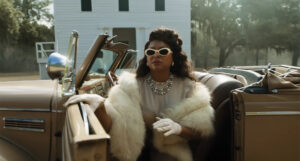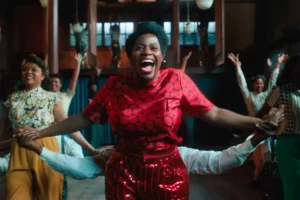The Color Purple (2023) review
Dir. Blitz Bazawule
By: Steve Pulaski
Rating: ★★★
At first blush, a musical adaptation of The Color Purple seems like a wrongheaded way to present a story predicated on Black womanhood underscored by hardships. Factor in the rape, abuse, incest, and poverty present in the narrative and it almost feels outright disrespectful. However, this is not a remake of Steven Spielberg’s 1985 film. This is a film adaptation of the musical — based on Alice Walker’s 1982 novel — directed by Ghanaian singer-songwriter Blitz Bazawule, who brings an exuberantly colorful display of strength and empowerment to the story, particularly in the film’s divine third act.
The story, for the most part, is left unchanged. The Color Purple shows us the life of Celie (portrayed as a young girl by Phylicia Pearl Mpasi, and in adulthood by Fantasia Barrino). As children, Celie and her sister Nettie (Halle Bailey, The Little Mermaid) are inseparable, spending their days frolicking through the meadows and signing youthful songs. This is their release from their abusive father; these moments are fleeting distractions from the fact that, when we drop in on Celie, she is pregnant for the second time and forced to bear her father’s children, whom he sells at birth. Eventually, their dad auctions Celie off to Mister (Colman Domingo). She’ll become his wife and transition from one cruelly abusive household to another.

When Nettie runs away, the sisters lose touch, and Celie is left to fend for herself over the course of decades. Mister’s biological son, Harpo (Corey Hawkins, Straight Outta Compton), later meets and marries Sofia (Danielle Brooks, a Tony-winning actress from the stage musical), a woman with no tolerance for disrespect nor subjugation. Meanwhile, Celie must reckon with the fact that her husband would rather be with another woman: Shug Avery (Taraji P. Henson, Hidden Figures), a nomadic blues singer who drops in and visits whenever she pleases. Celie operates day-to-day with the hope and belief that Nettie and her two children are healthy and happy, while occasionally seeing two different perspectives of womanhood from Sofia and Shug.
Bazawule’s The Color Purple shares something in common with Spielberg’s and that is in how it gives (presently) unknown performers a chance to shine. The 1985 film was the launchpad for an actress by the name of Whoopi Goldberg, along with Oprah Winfrey in her big screen debut. Bazawule’s film sees both Phylicia Pearl Mpasi and Fantasia Barrino starring in their first feature film and both leaving an impact on screen. Mpasi is powerfully expressive and strong in the realm of emoting, and her and Bailey have palpable chemistry that translates to their characters become adults, separated yes, but with Nettie’s impact on Celie never feeling too far gone. Barrino is electric too as she maintains this childlike sense of innocence despite the hell she’s endured. The greatness of these women’s performances amounts to their command of the screen.

That said, nobody steals the show like Danielle Brooks. Comparing Brooks’ turn as Sofia to Oprah Winfrey’s isn’t the right perspective. Sofia is charismatic, and Brooks’ portrayal of her is a one-two punch. She is solely responsible for some of The Color Purple‘s heartiest laughs and most tear-jerking moments. Screenwriter Marcus Gardley (also a poet and playwright) affords Brooks’ Sofia a triumphant third act that refuses to have her clubbed into submission as a result of a lengthy prison stint. One of the finest moments in this musical adaptation is one of Sofia’s first family dinners following her incarceration for assault. It’s also when Celie finds herself liberated from the fear of speaking out against Mister, and her actions prompt Sofia to do something she hadn’t done since she was released: laugh and speak.
The scene is also emblematic of how well this cast plays off one another.
Any and all of my apprehension towards this adaptation of Walker’s novel stemmed from the idea of how musical numbers, obviously designed to be catchy and memorable, would fit into a story brimming with so much sadness. While the 140-minute runtime and expansive nature of the story renders some of the songs expendable, there are a handful of impacting ones. “Hell No” captures the attitude of rebellion to authority and abuse while Barrino’s “I’m Here” is explosively cathartic, emerging at the right moment as Celie finds some shred of liberation and autonomy in her life. The Color Purple is Bazawule’s first feature-length musical (following his directorial contributions to Black Is King, alongside Beyoncé, released on Disney+ in 2020), and he directs most of these numbers with a veteran poise that reminds you the power of the theatrical musical.
I mentioned The Color Purple‘s third act as one of the film’s crowning achievements. It boils down to how the final 30-40 minutes work to reclaim Celie, Sofia, and Nettie’s plights in a way that’s mostly realistic and celebratory. Mister might get some too-easy grace, but if you can stomach that, you’ll find a triumphant climax that does Walker’s story justice and also reaffirms the positive messaging that might’ve been dampened by some of the miserablism in Spielberg’s story. In an era where the American musical feels marginalized, it feels good to see something this joyful grace theater screens.
NOTE: The Color Purple is now playing exclusively in theaters.
My review of The Color Purple (1985)
Starring: Fantasia Barrino, Taraji P. Henson, Danielle Brooks, Colman Domingo, Corey Hawkins, Gabrielle Wilson H.E.R., Halle Bailey, Phylicia Pearl Mpasi, Louis Gossett Jr., David Alan Grier, and Ciara. Directed by: Blitz Bazawule.
About Steve Pulaski
Steve Pulaski has been reviewing movies since 2009 for a barrage of different outlets. He graduated North Central College in 2018 and currently works as an on-air radio personality. He also hosts a weekly movie podcast called "Sleepless with Steve," dedicated to film and the film industry, on his YouTube channel. In addition to writing, he's a die-hard Chicago Bears fan and has two cats, appropriately named Siskel and Ebert!


